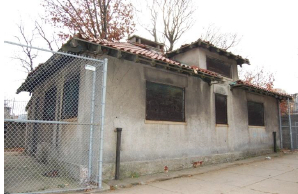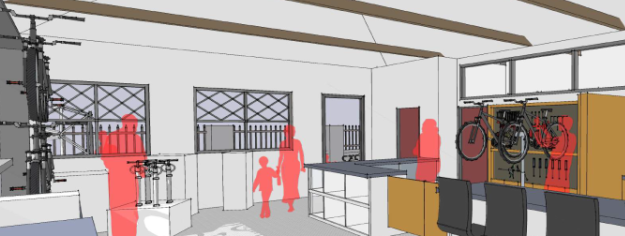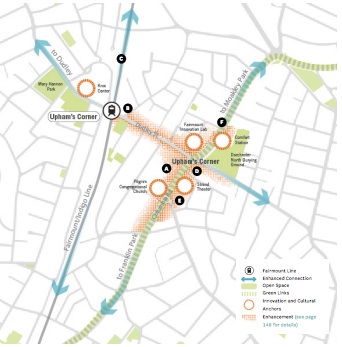

The historic Comfort Station (1912) on Columbia Road in Dorchester’s Upham’s Corner is a one-story stucco and tile “mission style” structure built as a “convenience station” for the streetcar system that used to connect Boston’s neighborhoods. It abuts the North Dorchester Burying Ground (1633), the final resting place of three African-American slaves and Dorchester’s earliest remaining landmark. Vacant for 40 years, it is an important piece of historic architecture that when put back into productive use as a community asset will expand the physical and economic health of the neighborhood and its residents.

Imagine Boston 2030, Boston’s first citywide plan in 50 years, designates Upham’s Corner as Boston’s first Arts Innovation District and explicitly identifies the Comfort Station as one of five critical innovation and cultural anchors (May 2017 Plan, pgs. 161-166). Additionally, in his 2017 State of the City address, Mayor Martin J. Walsh committed to extending Boston’s Emerald Necklace along Columbia Road, increasing access to green space and an enhanced transportation corridor. TACC is supporting the redevelopment of this building into a new public amenity and vibrant neighborhood asset responding to the needs of both people and place by thoughtfully aligning resident preferences with citywide plans.

In response to the City of Boston’s 2015 request for proposal for the 1,200 square foot building, TACC worked with local neighborhood associations and Upham’s Corner Main Street to identify local preferences for future use. Residents and business owners prioritized a community hub and coffee shop that increased access to the abutting burying ground; and returning the building to its transportation related roots. TACC brought together a unique, early partnership between Historic Boston Incorporated, an experienced nonprofit developer focused on historic preservation, Utile, Inc. Architecture + Planning, one of Boston’s leading architectural firms, and Bowdoin Bike School, a nonprofit that responds to the needs of low-income “subsistence” riders who use the bike as a means of transportation that is both cheaper than a car and faster than walking.
The partnership’s proposal for the redevelopment of the historic structure and use as a mission-driven bike shop and café, The Sip & Spoke Bike Kitchen, was selected by the city through a competitive process. The partnership has successfully obtained city approvals, historic tax credits, zoning changes, and developed construction documents. TACC is identifying gap funding from a range of public and private sources for this $990,000 project with an anticipated occupancy of May 2019.